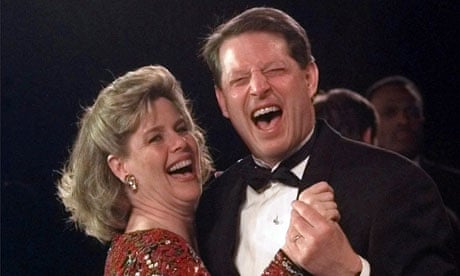To hear news of any marital break-up is a solemn moment, but the US has been genuinely shocked this week to learn that its former "second couple", Al and Tipper Gore, have agreed to separate after 40 years of marriage, a landmark they had celebrated with close family and friends only a couple of weeks ago.
The couple issued a statement on Tuesday saying it was "a mutual and mutually supportive decision that we have made together following a process of long and careful consideration". Friends of the couple were reported as saying no third party was involved, and that they had simply "grown apart". With Al Gore frequently away from home and wrapped up in his environmental work, one friend said "their lives had gotten more and more separated" – offering extra context, perhaps, to recent reports that the couple had bought a new luxury house in California, 2,000 miles away from their long-time family home in Tennessee.
Ever since Al was first elected to Congress in 1976, the Gores have been viewed in Washington as one of politics' most rock-solid, durable couples. This was the man who bought his wife a 1967 Mustang as a Valentine's Day present a few years ago to remind her of the car they travelled in when dating back in high school (his male friends say they have never forgiven him for raising the Valentine bar so high).
The couple experienced a roller-coaster of political fortunes over the years, none more dramatic than when Gore ran for the US presidency in 2000 after spending eight years as Bill Clinton's vice president. He narrowly lost out to George W Bush, of course, but one of the abiding memories of the campaign was "that kiss" at the National Democratic Convention, a lingering passionate embrace that left commentators cynical and smitten in equal measure.
"It was always easy to portray them as the perfect, all-American couple," says Clive Webb, a reader in North American history at the University of Sussex. "He was the lantern-jawed character and she was the pretty blonde wife. With their four kids and conventional looks, they were the quintessential American family. They were a striking contrast to the Clintons who, at the time of Gore's run for presidency, were mired in marital problems."
Webb says that Tipper helped to soften her husband's public reputation for being stiff and, at times, pompous. "She humanised him at a time when people were asking which candidate they'd rather have a beer with. Her role was largely to connect with the Bible Belt of Middle America, who viewed them as a traditional southern family."
In 2003, the Gores jointly authored a booked called Joined at the Heart: The Transformation of the American Family, in which they included anecdotes from their own marriage to help investigate the causes of these pressures. "For us, as for most Americans, family is our bedrock, and we believe the strength of the American family is the nation's bedrock," they wrote.
Sarah Churchwell, a senior lecturer in American literature and culture at the University of East Anglia, says the couple's split marks the end of an era in US politics – which, she adds, she won't mourn. "Tipper Gore represented the traditional political wife. In many ways, she was the quintessential Republican political wife. This hopefully will mark the end of wives as political accessories where marriage was viewed as a backdrop, a given."
For Churchwell's generation – an American teenager growing up in the 1980s – Tipper Gore is best remembered for her campaign via the Parents Music Resource Center to censor music and place "explicit language" stickers on records, after her then 11-year-old daughter was heard listening to Prince's Darling Nikki.
"We hated her back then for this," says Churchwell. "We only knew of Al then as her husband – my consciousness of her predates him. And for many Americans the name 'Tipper' means one thing: a privileged, conservative, southern background. This all later fed into her role as the traditional wife/mother promoting family values."
In recent years, Tipper has played a near nonexistent role in her husband's environmental campaigning. And, following the dizzy peaks of 2007, when his documentary An Inconvenient Truth led to Oscars and a Nobel peace prize, Al Gore's currency has fallen somewhat of late – largely due to his close association with, and advocacy of, climate science that has been under severe assault in recent months. But expect more from Gore. As New York magazine noted in 2006, he has developed a habit of stealing Bill Clinton's nickname – the Comeback Kid.

Comments (…)
Sign in or create your Guardian account to join the discussion